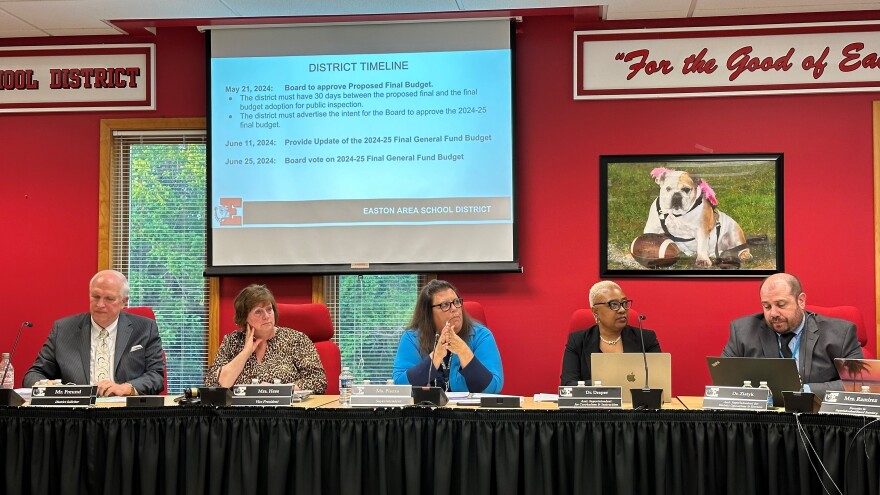EASTON, Pa. — Easton Area School District passed a proposed preliminary final budget for the 2024-25 school year with a 2.25% tax increase despite some disapproval Tuesday evening.
Following last week’s budget workshop, Superintendent Tracy Piazza presented the board of education with a budget featuring a projected $7,756,908 shortfall, with expenses amounting to $210,900,234 against revenue of $203,143,328, which the board approved.
A final vote is set for Tuesday, June 25.
Piazza provided the board with a quick overview of the previous week’s budget workshop presentation with practically no changes, although details concerning revenue and expenditures were clarified.
One standout portion of the meeting touched on the use of ESSER funding, which Piazza aims to utilize for the district’s summer program — a move that would allow EASD to make use of the funds before they expire toward the end of the year.
“And so we will be putting some of that $4 million back into the 24-25 budget still with the goal and aim that the ESSER dollars are spent by September 30," Piazza said.
"They need to be allocated by September 30 but liquidated… by December 30 of 2024. Our goal is to have them allocated and liquidated by September 30."
The board started the budget with a potential 3.5% property tax increase, though cost cutting measures – including eliminating positions through attrition and incentivized retirement, stopping building and department budgets, and exploring technology savings linked to a lease.
Piazza noted there will be no need for a lease in the 2024-25 budget “in terms of a new lease or payments to a lease,” though funding will still be allocated toward that item so it will carry through to the 2025-26 school year.
Explaining ESSER funding, Piazza detailed $1.46 million in ESSER I funds went toward technology purchases, support, and cleaning costs; $8.2 million in ESSER II funds which saw about $4.91 million go toward support and instructional services, with additional funding directed to professional development, counseling services, infrastructure upgrades, community support, and more; and just under $17 million of ESSER III funds which went to after school and summer programming.
About $10 million of ESSER funds remain, with administrators exploring options to utilize the funds before they expire.
Qs, As, and concerns with the board
Previously, board members expressed interest in class sizes throughout the district, which Piazza went through during the presentation.
For the 2024-25 school year, elementary school classes will host between 19 and 22 students in kindergarten, 19 to 24 students in first grade and second grade, 19 to 22 students in third grade, 17 to 22 students in fourth grade, and 20 to 25 students in fifth grade.
Middle school classes will see averages of 23 to 25 students in sixth grade, and 24 to 27 students in seventh and eighth grade.
High school class sizes will be determined depending upon the course, with a cap of 31 students per class.
Building budgets were determined to be $724,300 for 2024-25, reduced by $424,473 from the current year. Per pupil allotment came to $75 per elementary student, $85 per middle school student, and $95 per high school student, in addition to $35,000 for graduation.
Board member Michael Simonetta expressed concerns over the absence of a budget document, stating he was troubled to vote on the matter without paperwork.
“[M]ore importantly, more than anything for the public, if they want to have questions on a budget, they're just really torn on the fact that there's no budget document to approve, and a budget document has to be advertised within 10 days of tonight's approval, if it gets approved," Simonetta said.
"So that is a budget document, 2028, and that is a very large concern for me, as a board member to vote on something, to vote on to $13 million without a document. We're very concerned about that."
A board member clarified that all documents related to the budget were available to the board, though Piazza said “I don’t disagree with Mr. Simonetta in that I did not attach in here to this current agenda.”
One teacher, Kevin Deely, expressed concern over trimming staff via the retirement plan, urging the board to avoid replacing administrative staff when they retire, as they may do with other staff.
When the budget came up for a vote, Simonetta called for the matter to be tabled “until the actual document can be presented,” a motion seconded by Bill Whitman, though it failed to pass.
Board member Jodi Hess addressed Deely’s concern over staffing, stating the retirement incentives suggested would hopefully eliminate the need for cutting employees, before raising her own budget concerns.
“I will also say that I have concerns on certain information that was presented to us. There's some of the information even tonight for the backup and the support documents, for the numbers that we received. and so some of those were just presented tonight. So that's where I stand with it. And I have those concerns, which I had addressed previously,”Jodi Hess
“I will also say that I have concerns on certain information that was presented to us. There's some of the information even tonight for the backup and the support documents, for the numbers that we received. and so some of those were just presented tonight. So that's where I stand with it. And I have those concerns, which I had addressed previously,” Hess said.
Whitman rounded out commentary on the budget by proposing a future plan he referred to as the “2 2 2” plan.
“We're going to call it the 2 2 2 plan, then that would be number one, tap the budget this year at 2%. And going forward next school year, tap any non-contracted raises at 2%. And then going forward from there, restrict any new contract raises to 2%,” Whitman said.
Going forward, the board will provide a final general fund budget update on June 11, followed by a vote on the final general budget on June 25.


